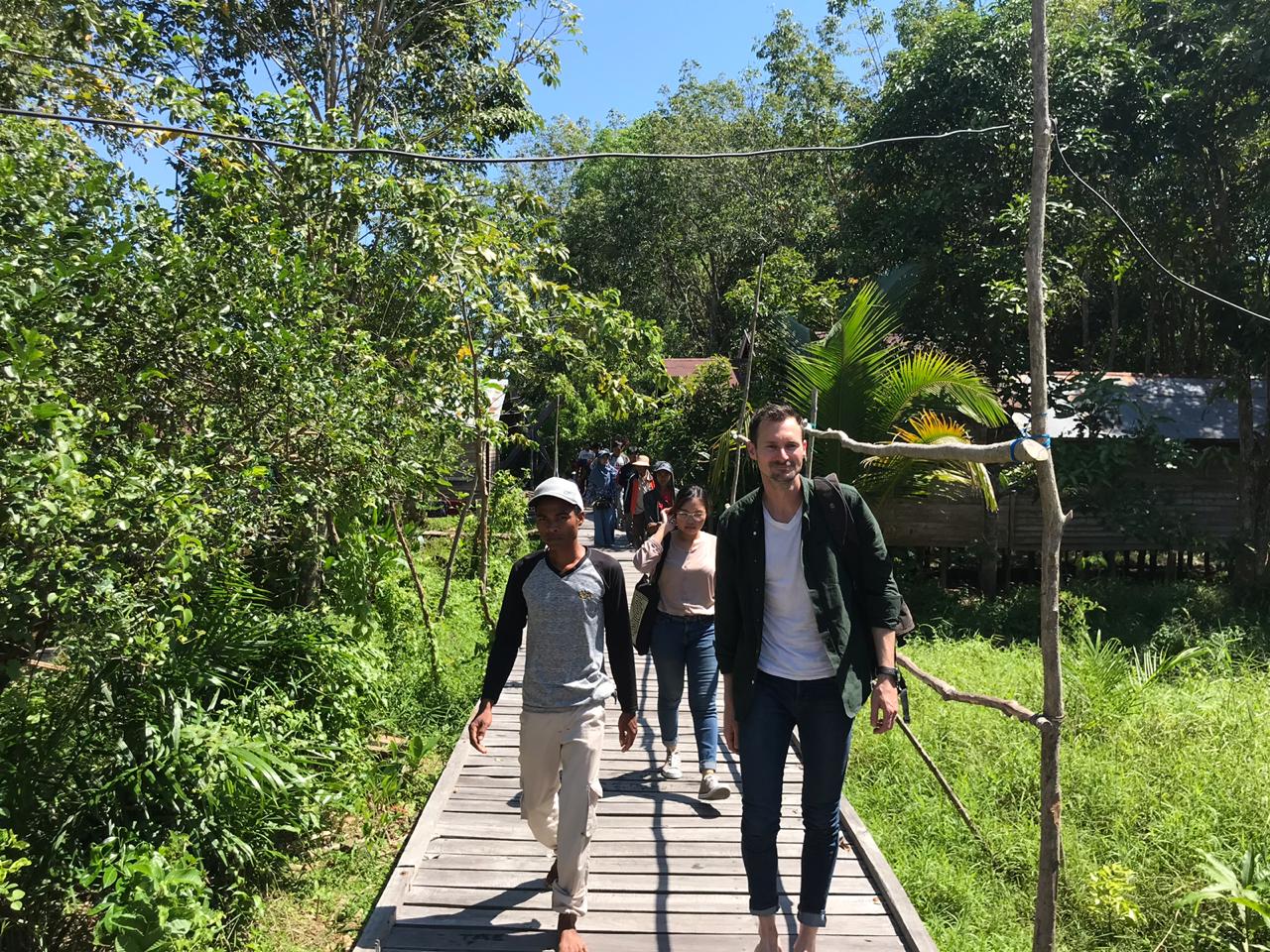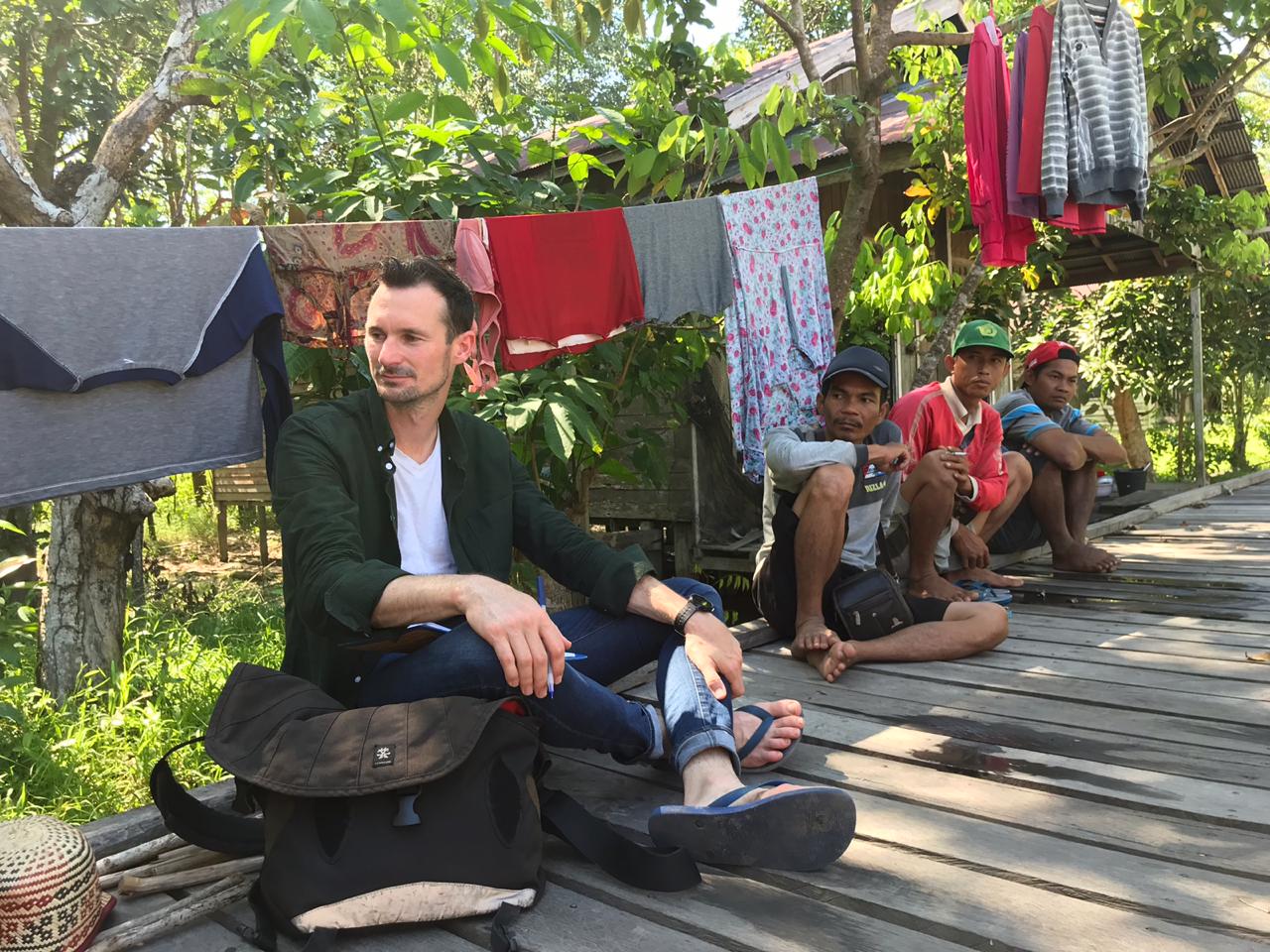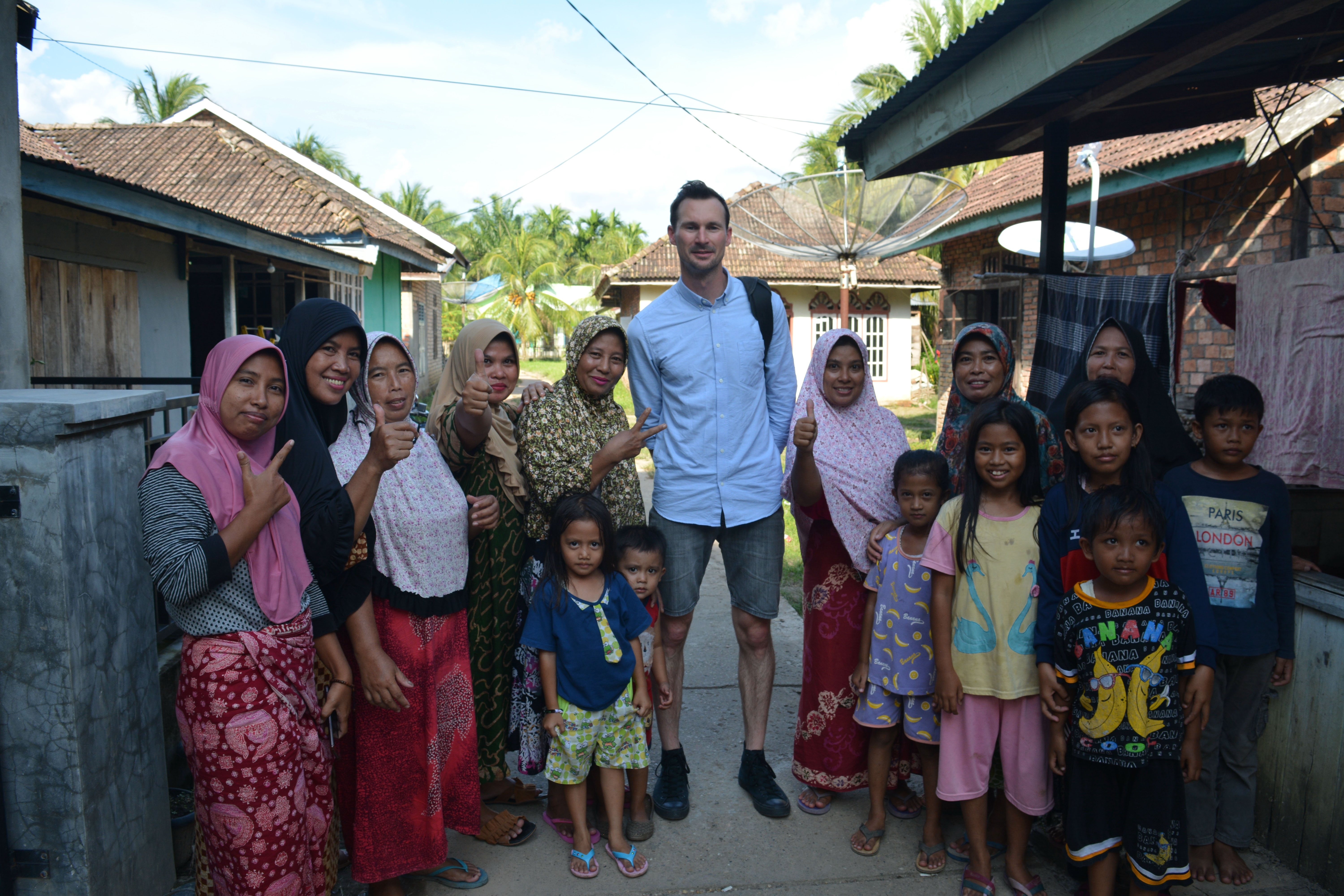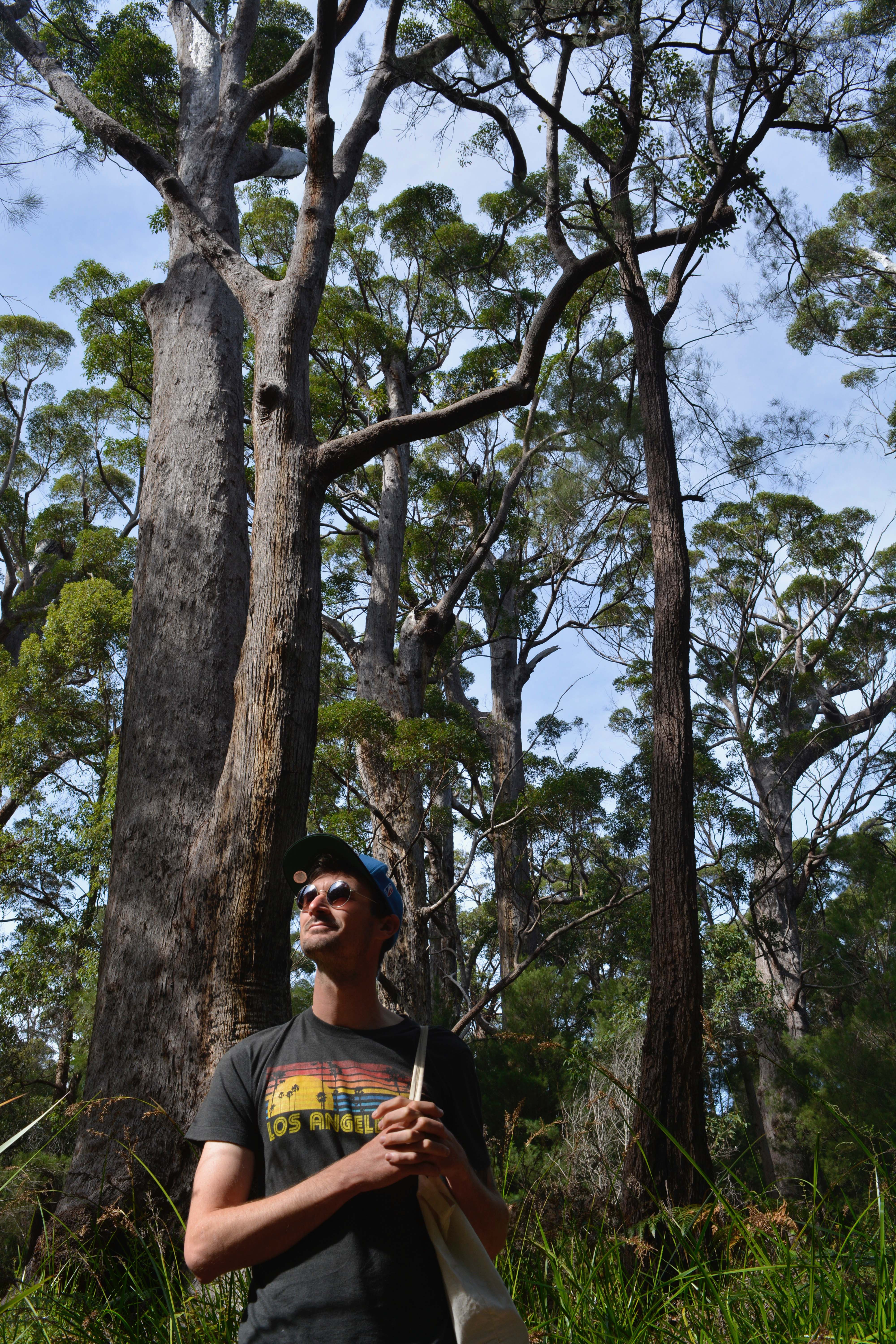Corporate lawyer turned social justice advocate, Michael Rice, shares his advice and career journey that has found him travelling to remote regions of the world while working for a more sustainable and socially-just society.
"The first thing I did after my final exams was get a used motorcycle, my motorcycle licence, and hit the road. I had accepted a grad position at Blake Dawson (now known as Ashurst), starting the following February, so I figured it was going to be my last great summer adventure for a while. I studied a Bachelor of Laws/Bachelor of Justice double degree, with a year of Creative Industries before that. After six years of full-time study and part-time work, I was ready for some fresh air and open spaces."
After completing the grad program at Ashurst in Brisbane, specialising as a Mining, Energy, and Native Title Lawyer, Michael relocated to Ashurst’s Melbourne office where he was promoted a few years later to Senior Associate.
Michael found the firm’s pro bono work particularly enjoyable, and further expanded his horizons through additional pro bono and volunteer work outside the firm. “I loved the experience of helping people understand and overcome the legal issues they faced. Learning about their circumstances helped me understand the structural barriers that prevent many people from accessing legal support and obtaining justice and the forces that push people into contact with the police and the criminal justice system,” he said.
After six years at the firm, Michael decided to follow his passion for social justice, international law and helping people.
"I knew for a good few years that I didn't really enjoy life at a commercial firm. I enjoyed the intellectual challenge of solving tricky legal problems, the emphasis on expertise and the steadfast commitment to quality that working at a big firm entailed, but I missed the feeling that my hard work was making a positive contribution to society. Sometimes the work was genuinely interesting and engaging, but it was also often tedious and dull. That’s just the reality of commercial law; the days are long, billable hours are a constant burden, and the office culture can be competitive, but you accept that as part of the deal. Some people love it. But at a certain point, I couldn’t reconcile my professional identity as a lawyer advising big mining and fossil-fuel companies with my personal views and values. My passion for social justice simply took over."
While working, Michael completed his Masters of Laws at University of Melbourne part-time and set his sights on a move overseas, making the focus of his studies Public International Law. “By then it was crystal clear to me that my passion lay in social justice and not commercial law," he said.
The decision to leave the corporate legal world behind would lead Michael to managing a pro bono legal clinic for young people in Melbourne, working for the United Nations in New York, the International Criminal Court in The Hague, and now Both ENDS in Amsterdam.
"So I left my job at the flashy law firm and returned to the pro bono sector, where I stumbled into a role as the principal lawyer at the Sunshine Youth Legal Centre (now known as WEstjustice)." At the time it was a small pro bono legal centre for vulnerable and disadvantaged youth in Melbourne’s western suburbs that comprised of one managing lawyer (Michael) and 12 law student interns from Victoria University. "Without a doubt, I count my brief tenure there as a career highlight. I remember being so proud of my team of VicUni interns who, towards the end of their placement, showed genuine ownership and responsibility for the centre, its clients, their cases, and each other.”
Michael explains, "in the social justice sector, you work for a better world rather than just a pay cheque. Of course the not-for-profit sector has its challenges; funding, obviously, is a big one, which usually means that positions are scarce, pay is low, offices are old, and resources are limited. The slow pace of policy change can be hard to accept, but the feeling of solidarity amongst civil society around the world is energising. The more I work in the social justice sector, the more inspiring stories I hear from environment and human rights defenders, and the more of the world’s diversity I see, the more certain I am that there is so much more to life than working for a big salary or bigger company profits."
Michael continued to broaden his horizons with an unpaid legal internship with the United Nations in New York and a six month placement as an unpaid Visiting Professional working with the President of the Appeals Chamber at the International Criminal Court in The Hague before starting his position at Both ENDS in Amsterdam, The Netherlands.
Both ENDS is a human rights and environmental justice NGO. For the last three years Michael has been their Natural Resources Governance Officer, responsible for shaping strategy and implementing projects in Asia.
What does Both ENDS do? In a nutshell, he says, "we work in partnership with NGOs and civil society organisations around the world fighting to protect the environment, the rights and livelihoods of Indigenous Peoples and local communities affected by unjust trade and investment policies or irresponsible corporate conduct, and we support local, bottom-up movements fighting for a fair, inclusive and sustainable world."
 His projects relate to natural resource governance, including climate change, land rights, local economic empowerment, gender justice, corporate accountability, international financial flows, global value chains and human rights. Collaborating with local organisations and community groups, Michael assists them to defend against land grabs, promote equitable land governance practices, improve transparency and accountability in the natural resources sectors and supports local communities to access grievance mechanisms to seek redress for legal and human rights infringements.
His projects relate to natural resource governance, including climate change, land rights, local economic empowerment, gender justice, corporate accountability, international financial flows, global value chains and human rights. Collaborating with local organisations and community groups, Michael assists them to defend against land grabs, promote equitable land governance practices, improve transparency and accountability in the natural resources sectors and supports local communities to access grievance mechanisms to seek redress for legal and human rights infringements.
On a day-to-day basis his work boils down to plenty of communication, planning and organising. "I’m responsible for coordinating a large part of our partner network in Asia, so I’m kept busy with maintaining relationships by email, WhatsApp and Skype, sharing information about new developments or announcements, and developing proposals for joint projects. For example, organising delegations of human rights defenders and Indigenous Peoples representatives to visit Europe requires months of preparation, but their accounts of the impacts of bad EU trade and investment policies on local communities are exactly what EU policy-makers need to hear. I also visit partners in their home countries, organise side-events at international conferences, and join partners on trips into the field – usually the highlight of my year, but it all takes good planning and communication."
Michael’s LinkedIn profile reads:
"I'm inspired by the humility, humour, and courage of communities fighting for their rights against the odds and am motivated by the urgency and possibility of shifting economic and political power towards visions of climate justice."
We asked him to share more about what this meant to him, and how it manifests in his work.
"Growing up as a white, educated male in Australia, I knew I was privileged, but I had no idea how advantaged, safe and reliable Australia was until I had the opportunity to meet and visit people from countries across the Global South. Only after learning what daily life is like for most people outside Australia do you realise how privileged we are.
 Most of the communities Both ENDS and our partners support are on the fringe of mainstream society; they are excluded or marginalised from public infrastructure, public services, political influence, economic power and livelihood opportunities. They have limited access to education, healthcare, sanitation and electricity, let alone legal advice or support services. They face exploitation, intimidation, persecution, threats, displacement and sometimes violence from agents of corrupt police, government officials and corporate actors interested in obtaining their lands, resources, forests or waters. For the countless communities in this situation, life can be harsh.
Most of the communities Both ENDS and our partners support are on the fringe of mainstream society; they are excluded or marginalised from public infrastructure, public services, political influence, economic power and livelihood opportunities. They have limited access to education, healthcare, sanitation and electricity, let alone legal advice or support services. They face exploitation, intimidation, persecution, threats, displacement and sometimes violence from agents of corrupt police, government officials and corporate actors interested in obtaining their lands, resources, forests or waters. For the countless communities in this situation, life can be harsh.
 When I’ve had the opportunity to visit such communities, I’ve been amazed by the tremendous source of richness, unity, integrity, and humour provided by their collective culture, traditions and identity. Despite all the forces working against them, despite living with exploitation and rights abuses on a daily basis, despite sharing painful stories of land grabbing, persecution and lost livelihoods and having no clear access to justice available, conversations still often end in laughter and smiles. Their endurance against the odds inspires me.
When I’ve had the opportunity to visit such communities, I’ve been amazed by the tremendous source of richness, unity, integrity, and humour provided by their collective culture, traditions and identity. Despite all the forces working against them, despite living with exploitation and rights abuses on a daily basis, despite sharing painful stories of land grabbing, persecution and lost livelihoods and having no clear access to justice available, conversations still often end in laughter and smiles. Their endurance against the odds inspires me.
As for climate change, despite the apocalyptic headlines and alarming scientific reports – which should be taken absolutely seriously – climate change fills me with hope. The climate crisis is an unprecedented opportunity to re-imagine our economies, societies, values and priorities. Large-scale change is already essential. Climate change is not the problem, it’s the messenger; telling us that our global fossil-fuelled, mass-consumption, growth-obsessed, race-to-the-bottom economy cannot continue without catastrophic consequences. The escalating imperative for drastic action to over-haul our energy, transport, trade, and taxation systems – our entire development model, opens space for inclusive, equitable, fair and eco-centric alternatives."
Back where it all began, Michael's undergraduate degree at QUT has played a large role in where he is today.

"Without a doubt, I would not be where I am now if not for my studies at QUT. My Justice classes on ethics, Indigenous justice and public policy shaped my perspective on social justice issues, and my involvement in student politics and the Student Guild taught me a lot. My decision to do an exchange semester completely changed my life. I was halfway through my studies and needed a break from life as a full-time student surviving on Youth Allowance, trying to get HDs while working a part-time job and living in a chaotic share-house (if you know what I mean, hang in there!). I started asking about the possibility for an exchange semester and before I knew it, found myself bound for Copenhagen. I met my future wife on the first day of the international student introduction. 100% life-changing. Studying abroad also completely changed my perspective on Australia, Australian politics, global affairs and society in general. I studied philosophy, made life-long friends from around the world and travelled throughout Europe. It was an amazing journey. I’d recommend a semester abroad to anyone interested in the world beyond Australia’s borders."
We asked Michael what his biggest learning from moving overseas and working in an international context was and he stressed the value of learning other languages.
"Your language skills are your professional passport; the opportunities available to you will be multiplied by the languages you speak. Being a native English-speaker can be an advantage, but speaking only English is not. If you speak only English, your career prospects are limited to English-speaking workplaces. Learning Spanish, French, German or Bahasa never occurred to me as a public schoolboy in regional NSW, but my goodness I wish I had learned a second language. Your potential to work in an international context will be influenced by where and with whom you can work. A second language will literally expand your horizons."
Michael's advice to current law students?
The legal industry may be changing rapidly but I think the skills you need to succeed aren’t. If you are a diligent worker, a critical thinker, have attention for detail, show initiative, and if you have a good head on your shoulders and can build positive relationships with colleagues and clients, you will succeed. There’s no doubt it’s competitive for law grads looking to enter the profession these days. However, I also think employers now see the value in a wider diversity of experience, not just the traditional moot competitions and clerkships.
If you want to pursue a career in social justice, here's Michael's advice:
"Don’t wait. Get involved. Volunteer. You will learn a lot and it’s extremely rewarding. The most grateful, humble and respectful clients I ever had were the most disadvantaged and vulnerable people you’re likely to come across. You’ll find that the interactions you have with complete strangers while volunteering can be the most genuine and meaningful, whether you’re volunteering at a legal support service or a soup kitchen. In exchange for your time and patience, you will learn all kinds of valuable skills; client interviewing, case management, research, drafting, relationship management, negotiation etc. Volunteering your time to help those in need can teach you things about the justice system, law enforcement and what ‘access to justice' means for ordinary people that you will never learn in the classroom. If your experience is like mine, you’ll find that the more you volunteer, the more motivated and energised you become to learn more, do more, and get active."
What’s next?
"For now, I’m pretty preoccupied with the struggle to transform our food and energy systems to deliver genuine development for local peoples while ending environmental destruction, climate damage and human rights abuses. That’s more than enough to keep me busy, and there are new emergencies and challenges every week.
That’s one thing about the social justice sector – there is never a shortage of worthy cases to work on! (It’s just the funding to do it that’s in short supply, unfortunately.) Despite the professional and personal challenges of working in the social justice sector, I can’t see myself returning to the private sector.
Major changes are needed in our economic, energy, food, and taxation systems, and there’s so much at stake if we can’t make them soon. We need as many people joining the fight for the planet as possible. I hope my story can inspire other QUT Law students to get involved in social justice struggles. If so, contact me! We’re stronger when we work together."
You can find Michael Rice on LinkedIn here.
For more information on QUT Bachelor of Justice/Bachelor of Laws (Honours) see here.

